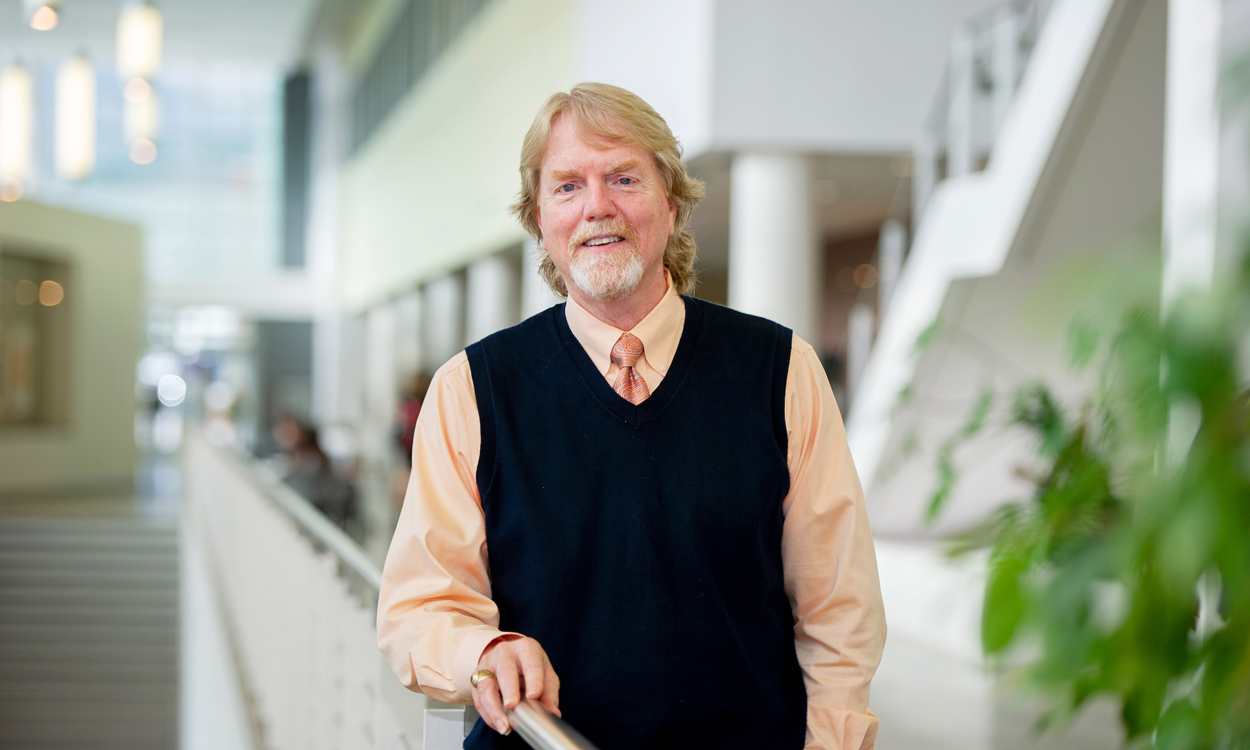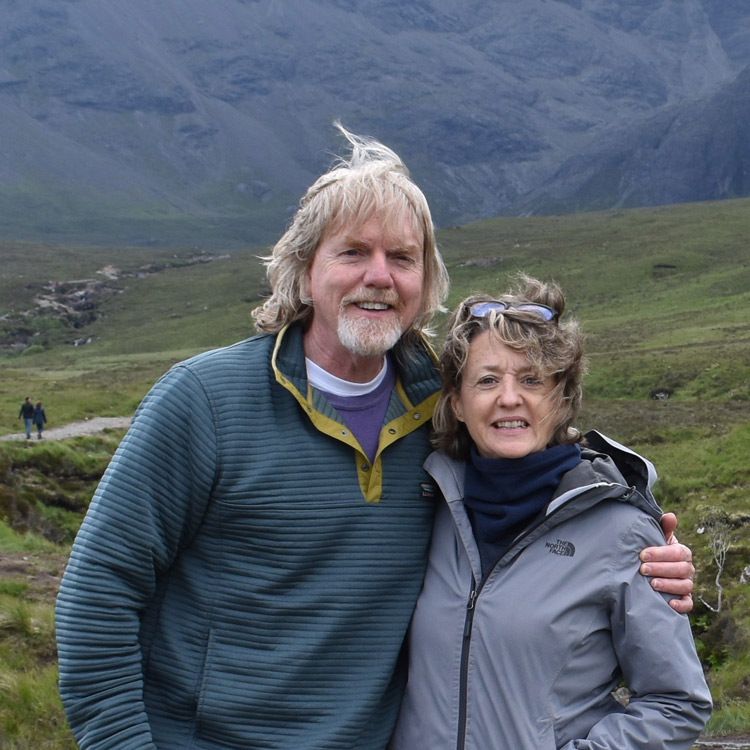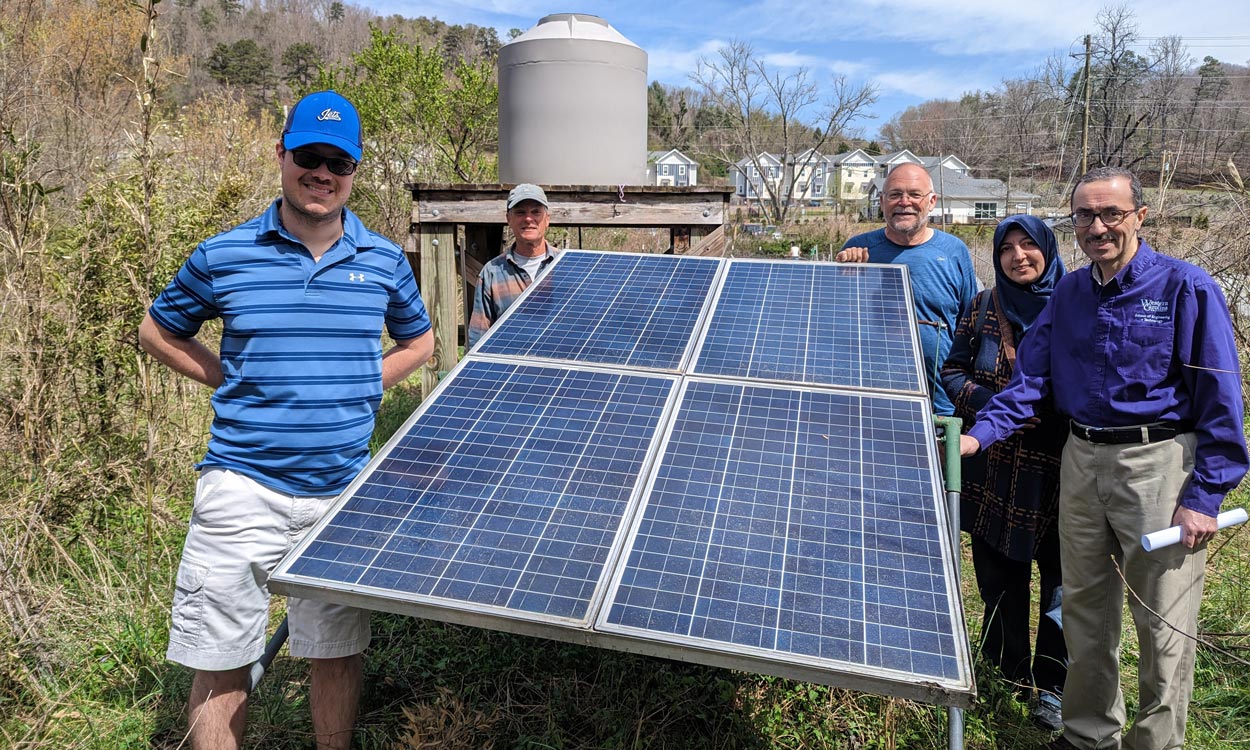New scholarship in communication sciences, disorders celebrates retiring professor, spouse

Billy Ogletree
By Bill Studenc
A recently launched scholarship fund in honor of Billy Ogletree, the Catherine Brewer Smith Distinguished Professor of Communication Sciences and Disorders at Western Carolina University, and spouse Julie Ogletree, a long-time speech-language pathologist, is designed to help future professionals who will listen to and serve those who might otherwise go unheard.
Creation of the Billy Townsend Ogletree and Julia Katherine Tweedy Ogletree Endowed Scholarship in Communication Sciences and Disorders comes as Billy Ogletree has announced his retirement effective June 30, 2024, after 32 years as a WCU faculty member.
The fund is designed to provide support to students in communication sciences and disorders, with special consideration for those interested in working with people with intellectual disabilities.
The Ogletrees and Billy’s brother, Mississippi attorney Gee Ogletree, have provided gifts and pledges accounting for 50 percent of the minimum $25,000 necessary for the fund to begin providing scholarships to students. With additional contributions from friends, family and colleagues, the fund now stands at more than $21,500.
David Shapiro, WCU’s Robert Lee Madison professor emeritus of communication sciences and disorders, is leading an effort to cross the $25,000 threshold.
“Not only have people shown support by making financial gifts to the fund, but some have also shared their gratitude for the purpose of this scholarship. One donor expressed it best when she conveyed, ‘A scholarship supporting training that will ultimately improve conditions for those with intellectual disabilities is sorely needed and speaks directly to a call to serve the ‘least of these’,” Shapiro said.
“Despite the presence of intellectual disabilities and many of its concomitant conditions – such as autism, cerebral palsy and seizure disorders – across countries and cultures, specialists are few,” he said. “Such specialists empower those who then ‘pay it forward, bringing success and independence to others.”
“Paying it forward” is a big reason for the Ogletrees’ scholarship, Billy Ogletree said.

Billy and Julie Ogletree on a trip to Scotland.
“Julie and I were both blessed to have solid financial support during our educations,” he said. “We know that is not the case for all. I’ve seen so many students with a passionate interest in their studies work multiple jobs and make tough sacrifices. We wanted to make an education in speech pathology more accessible to those with financial need.”
He traces his career path to a chance encounter at age 18 with a person who could not speak. “A well-dressed man approached me as I was working on a store front and could not express himself,” he said. “It profoundly affected me, piquing an interest that resulted in declaring my major as a freshman and a wonderful career in speech-language pathology. Julie’s decision started with a career placement test that suggested speech pathology, something she had never heard of. Both of us eventually found our ways to working with people with intellectual disabilities, our true passion and calling.”
Before Julie Ogletree took that test recommending speech-language pathology, she had declared psychology as her major. “However, I had worked in a day care center for the elderly, and a woman who finger-spelled caught my attention and interest. Later, when I was shadowing psychologists visiting the state mental institute in Florida, there was a young woman who used sign language to communicate. Communication was what I was most interested in, but I didn’t know there was such a field as speech-language therapy,” she said.
“My career started to include more people with intellectual disability and autism, and that’s been a main focus, along with young people with language disorders that affect their learning. Although I’ve worked in different settings, I have found that working in the schools where children are learning and communicating five days a week has been most rewarding,” she said.
Billy and Julia Ogletree agreed they especially want to support students planning careers working with people with intellectual disabilities.
“This population has had my heart for my entire career,” he said. “I can say the same things for Julie. We both just love folks with ID and see so much potential there. We want students of the future to develop that love as well.”
The idea to create a scholarship marking Ogletree’s retirement originated with his sibling, who was the brainchild behind a fund honoring family members at the University of Southern Mississippi, where Billy Ogletree earned his bachelor’s degree.
In fact, supporting scholarships in honor of loved ones has become an Ogletree family tradition, beginning with family patriarch Powell Ogletree, who worked at Southern Miss for 35 years as director of alumni affairs, Gee Ogletree said.
“As he asked others for support for scholarships, it was only natural for him to create one himself,” he said. “After my parents passed away, we decided to contribute to the scholarship in their honor in lieu of giving family Christmas gifts to each other. We all enjoy reading about the students who annually receive the award named after our parents.”
When he learned his brother was nearing retirement, he realized providing seed money for a WCU scholarship in communication sciences and disorders would make a suitable retirement gift.
“Bill has worked at Western almost as long as our father worked at Southern Miss. Since the vast majority of his professional career was devoted to Western and he and Julie have a deep love for the institution as well as their academic and professional calling in communicative disorders, a scholarship seemed appropriate,” he said.
“I know that Bill, Julie and their family will enjoy learning about the students who receive the Bill and Julie Ogletree Endowed Scholarship,” Gee Ogletree said. “Our extended family will make Christmas gifts to either or both our parents’ or Bill and Julie’s scholarship. This will continue the tradition of our family giving to Ogletree scholarships for deserving students at outstanding institutions of higher learning.”
Billy and Julia Ogletree are long-time residents of Sylva, moving to the area when he joined WCU’s faculty in 1992. He has served WCU in a variety of capacities including program director and department head for communication sciences and disorders. He has procured more than $3.5 million in external support for student training, published more than 90 articles and initiated the Cullowhee Conference on Communicative Disorders, the largest annual continuing education effort for speech-language pathologists west of Greensboro.
He has received WCU’s Distinguished Service and University Scholar awards and was named Catherine Brewer Smith Distinguished Professor in 2018. He was selected as an outstanding alumnus at the University of Memphis, where he received his master’s degree, and Florida State University, where he earned his doctorate.
He has served in several national roles including chairing the National Joint Committee for the Communication Needs of Persons with Severe Disabilities. He is a Fellow of the American Speech-Language-Hearing Association. In 2020, he was recognized with the University of North Carolina System’s highest award for service, the James M. Holshouser Award.
Julie Ogletree earned her bachelor’s and master’s degrees in speech-language pathology at Florida State, where she received the Doris Faucet Brown Scholarship. She served as a speech-language pathologist in various settings including a children’s hospital, private practices, group homes and public schools.
Her longest tenure was with Cherokee Central Schools, where she served middle and high school children and was responsible for augmentative and alternative communication assessments. She also served on an award-winning interprofessional team (recipient of the 2018 McLean Yoder Award of Professional Excellence) at Cherokee that provided assessment services for children on the autism spectrum.
She characterized the decision to establish a scholarship as part of her husband’s commitment to what Gurney Chambers, retired dean of the College of Education and Allied Professions, has called “the Western Way.”
“In everything Bill has ever done professionally, he would say ‘this will be good for Western.’ He has always strived to bring quality speakers to the Cullowhee Conference and create more opportunities for students and professionals across Western North Carolina to continue their education. I have supervised many WCU students and have always felt a part of the program. The scholarship is our parting gift to future WCU’s communication sciences and disorders students to continue in the ‘Western Way’ and make a difference for people with communication challenges.”

